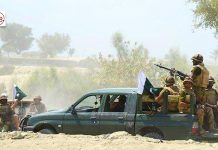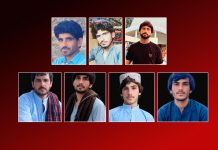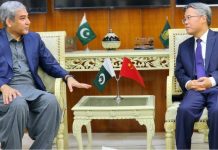Human rights activist and Baloch Yakjehti Committee (BYC) leader Sammi Deen Baloch has said that peace is not a dream but a fundamental right — and that the state’s crackdown on peaceful voices in Balochistan is an attack on justice, equality and human dignity.
In a statement shared on X, Ms Baloch said the current wave of repression was rooted in the state’s refusal to tolerate calls for peace and justice.
“Peace is not merely a wish — it is a fundamental human right. It is not a dream, but an undeniable reality deeply rooted in the eternal philosophy of life,” she wrote. “The state’s ongoing crackdown against us is because we seek peace, demand justice, and call for equality.”
“We ask not for corpses and disappearances. We simply demand that our rights be acknowledged,” she said.
Ms Baloch added that if the state believes it can silence this struggle — “a voice nurtured under repression” — through imprisonment, raids and threats, then it is mistaken.
“This voice is not just a collection of words — it is the essence of sighs, sobs, cries, and tears that have burned in our hearts for generations and have now become our strength,” she said. “It is not the call of a single individual — it is the collective conscience of an entire nation.”
She also referred to the ongoing detention of several BYC leaders, including Dr Mahrang Baloch, Bebarg Zehri, Sibghatullah Shah Ji, and Beebow Baloch, along with the targeting of their families and supporters.
“We may be subjected to imprisonment. Handcuffs may be placed on our wrists. Our families may be abducted. Every limit of retaliation may be crossed. But the philosophy of this struggle — rooted in truth, justice, and human dignity — cannot be shackled.”
Ms Baloch said the use of state power to crush peaceful dissent only raises questions about the legitimacy of the state itself.
“When oppression is used to silence peaceful voices, it does not end the resistance — it exposes the moral and political failure of the state,” she said. “Pakistan has created the perception — and now the reality — that there is no space left for peaceful struggle in Balochistan.”
She warned that by treating demands for rights and recognition as a crime, the state was pushing the region toward deeper alienation.
“If the Baloch were seen not just as Baloch but as human beings, perhaps this resistance would not have grown so intense,” she wrote. “But if the state continues to suppress every voice, it must understand: the Baloch have the courage to resist — and no bullet or baton can extinguish that.”
Ms Baloch concluded by urging authorities to rethink their approach and choose dialogue over force.
“If the state truly wishes to avoid turning Balochistan into a battlefield, it must ask itself what message its policies are sending: is it reconciliation, or is it total alienation?”
“The voices that were long silenced have now become echoes,” she said. “And these echoes demand that the state choose understanding — not the gun.”






























